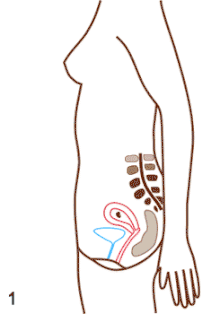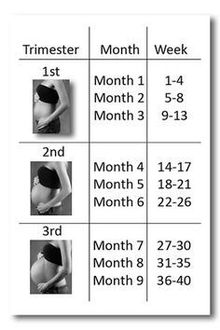ICD-10 Coding/Pregnancy, Childbirth and the Puerperium
This lesson introduces ICD-10-CM Pregnancy, Childbirth and the Puerperium.
Objectives and Skills
[edit | edit source]- Correctly apply ICD-10-CM coding guidelines for accurate selection and sequencing of diagnosis codes commonly used to describe complications of pregnancy, childbirth, and the puerperium
- Apply ICD-10-PCS coding guidelines for accurate selection of procedure codes commonly used to diagnose and treat complications of pregnancy, childbirth and the puerperium
- Explain what is included in a normal delivery and what excludes it from being a normal delivery
- Know and apply key terms from the chapter (i.e. gravida, para, antepartum, peripartum, postpartum, puerperium, etc)
- Demonstrate use of the proper Z codes when coding outcome of delivery

Guidelines
[edit | edit source]Start Here:
[edit | edit source]https://www.cms.gov/Medicare/Coding/ICD10/Downloads/2019-ICD10-Coding-Guidelines-.pdf (Chapter 15 specific guidelines can be found on pages 60-68 of these document)
[edit | edit source]Part 1: Diagnoses
[edit | edit source]Chapter 15 Guidelines PowerPoint

Chapter 15 guidelines Introduction video
CG.I.C.15.a.1-6 (General Rules for Obstetrics Cases)
[edit | edit source]15.a.1 Chapter 15 codes and Sequencying Priority
15.a.2 and 15.a.3 Maternal record only and Final Character for Trimester
15.a.6 Seventh Character for Fetus Identification
CG.I.C.15.b.1-5 (Selection of OB Principal or First-Listed Diagnosis)
[edit | edit source]15.b.1 Routine Outpatient Prenatal Visits
15.b.2 Supervision of High-Risk Pregnancy
15.b.3-5 Episode when No Delivery Occurs, When a Delivery Occurs, Outcome of Delivery
CG.I.C.15.c and d (Pre-existing Conditions vs Conditions Due to the Pregnancy and Pre-existing Hypertension in Pregnancy)
[edit | edit source]CG.I.C.15.e.1-2 (Fetal Conditions Affecting the Management of the Mother)
[edit | edit source]15.e.1 and 15.e.2 Codes from Categories O35 and O36 and In Utero Surgery
CG.I.C.15.f (HIV Infection in Pregnancy, Childbirth and the Puerperium)
[edit | edit source]15.f HIV Infection in Pregnancy, Childbirth and the Puerperium
CG.I.C.15.g, h & i (Diabetes Mellitus in pregnancy, Long Term Use of Insulin and Oral Hypoglycemics and Gestational (Pregnancy Induced) Diabetes)
[edit | edit source]CG.I.C.15.j and k (Sepsis and septic shock complicating abortion, pregnancy, childbirth and the puerperium and Puerperal sepsis)
[edit | edit source]CG.I.C.15.l and m (Alcohol, tobacco and drug use during pregnancy, childbirth and the puerperium and Poisoning, toxic effects, adverse effects and underdosing in a pregnant patient)
[edit | edit source]CG.I.C.15.n.1-3 (Normal Delivery, Code O80)
[edit | edit source]CG.I.C.15.o.1-5 (The Peripartum and Postpartum Periods)
[edit | edit source]CG.I.C.15.p.1-3 (Code O94, Sequelae of Complication of Pregnancy, Childbirth, and the Puerperium)
[edit | edit source]15.p.1-3 Code O94, After the initial postpartum period and Sequencing of Code O94
CG.I.C.15.q.1-3 (Termination of Pregnancy and Spontaneous Abortions)
[edit | edit source]CG.I.C.15.r (Abuse in a pregnant patient)
[edit | edit source]15.r Abuse in Pregnant Patient
***Some examples can be found in your Coding Clinic here:
ICD-10-CM/PCS Coding Clinic®, Fourth Quarter 2016 Pages: 125-126 and 150
ICD-10-CM/PCS Coding Clinic®, First Quarter 2016 Pages: 3-6[1]
Part 2: Procedures
[edit | edit source]https://www.cms.gov/Medicare/Coding/ICD10/2019-ICD-10-PCS.html(Official 2019 PCS coding guidelines and Code Tables and Index)
ICD-10-PCS Procedure coding Obstetrics guidelines
PCS Obstetrics Guidelines video

Obstetric Procedure Case Examples
[edit | edit source]
Learning Resources
[edit | edit source]ICD-10-CM Pregnancy and Childbirth Bootcamp
Demonstration of Stages of delivery
Pre-existing diabetes and pregnancy
Activities
[edit | edit source]Quizlets for Chapter 15 Guidelines:
https://quizlet.com/_68g0tq (Chapter 15 Guidelines - General rules for Obstetric Cases)
https://quizlet.com/_68gd67 (Chaapter 15 Guidelines - selection of OB Principle or First-listed Diagnosis)
https://quizlet.com/_68go3d (Chapter 15 Guidelines - pre-existing HTN, fetal conditions affecting mom, HIV, Diabetes)
https://quizlet.com/_68h1m4 (Chapter 15 Guidelines - sepsis, alcohol/tobacco, poisoning & normal delivery)
https://quizlet.com/_68hcgx (Chapter 15 Guidelines - Peripartum/Postpartum, Sequelae, termination/abortions)
Quizlets for Key Terms/Pregnancy Cheat Sheet:
https://quizlet.com/_68hzlm (Important Chapter 15 Key Terms)
https://quizlet.com/_68ia13 (Normal Delivery (O80) Notes & Important Z codes)
Lesson Summary
[edit | edit source]Review:
Chapter 15 General Guideline Assessment
Chapter 15 Selection of OB principal and first listed diagnosis Assessment
Chapter 15 Pre-existing HTN & More Assessment
Chapter 15 Sepsis & More Assessment
Chapter 15 Peripartum & More Assessment
- Important Chapter 15 vocabulary (see Key Terms)
- Diagnosis Guidelines and Code Scenarios (see Guidelines and Coding Examples)
- Procedure Guidelines and Code Scenarios (see Guidelines and Coding Examples)
Key Terms
[edit | edit source]
Trimesters (majority of codes in Ch. 15 have a final character for trimester)
- First trimester – less than 14 weeks, 0 days
- Second trimester – 14 weeks, 0 days to less than 28 weeks, 0 days
- Third trimester – 28 weeks, 0 days to delivery
7th Character to Identify Fetus:
0 – single gestation, documentation on record is insufficient and unable to clarify or not clinically possible to determine which fetus)
1 – Fetus 1

2 – Fetus 2
3 – Fetus 3
4 – Fetus 4
5 – Fetus 5
9 – Other fetus
Peripartum and Postpartum Periods
Postpartum Period: Begins immediately after delivery and continues for 6 weeks
Peripartum Period: the last month of pregnancy to 5 months postpartum
Postpartum Complication: Any complication occurring within the 6 week window after delivery
****Chapter 15 Important Terms Cheat Sheet********
[edit | edit source]See Also
[edit | edit source]- ↑ hiacode (2019-01-31). "Coding Tip: Pregnancy, Childbirth, and the Puerperium Tidbits". HIAcode. Retrieved 2019-03-18.
References
[edit | edit source]Information on Gestational Diabetes
Information on HIV/AIDS and pregnancy
Information on Sepsis and pregnancy
2019 ICD-10-CM/PCS Medical coding reference
Questions on OB cases answered
